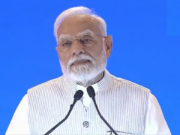The bullet train project is “a marvel of engineering and a step towards the path”. (Photo: DNA India) (Representational Image)
Railway Minister Ashwini Vaishnaw shared a video depicting the project’s excavation and tunnelling activities, as well as how geotechnical instruments are being used to traverse these hurdles.
The Mumbai to Ahmedabad bullet train project is one of the Indian Railways’ most highly anticipated projects.
Many have dubbed this initiative a game changer because it promises to transform the Indian railway network. This cutting-edge programme promises to reduce travel time between Mumbai and Ahmedabad to just two hours, representing a major improvement over conventional trains and buses.
Recently, Railway Minister Ashwini Vaishnaw shared an update on the bullet train project on X (Formerly Twitter) by posting a video showing the excavation and tunnelling work, as well as how geotechnical instruments are being used to traverse these hurdles. “Instrumentation technologies for enhanced safety and better monitoring in the Bullet Train project,” Vaishnaw captioned the video.
Watch the video here:
The video emphasises that excavation and tunnelling are major problems for the project, particularly when the underground tunnel is located beneath a city like Mumbai.
Because of the tunnelling operations, the project requires that the adjacent structures be safe. This is why geotechnical instruments are being used to conduct highly sensitive monitoring of civil structures and pipelines in the areas surrounding the project to assure their safety.
Such instruments are significant in assuring the safety of both the current tunnelling work and the structures that surround it. The video further showed that several geotechnical equipment had been installed to monitor tilt settlement, vibration, cracks, and deformation, ensuring the overall safety of tunnels, shafts, and adjacent structures.
The video goes on to say that geotechnical instruments are linked to their appropriate modules, allowing for the recording and monitoring of pertinent information via a dashboard interface.
Furthermore, data is regularly monitored, allowing for early discovery of potential problems and fast mitigation steps. Additionally, monitoring deployed at tunnelling sites aid in the control of dust and noise, ensuring that air and noise pollution remains within acceptable limits. The video concludes by describing the bullet train project as “a marvel of engineering and a step towards the path”.
The Mumbai to Ahmedabad bullet train project was initiated in September 2017 with Japan’s support. However, repeated delays have hampered the project’s progress, dampening people’s eagerness.
As per the Financial Express, a recent Right to Information (RTI) request from the National High Speed Rail Corporation Limited (NHSRCL) regarding the project’s completion timeline showed that the Indian Railways is unclear about it because all work tenders have not yet been issued.


































